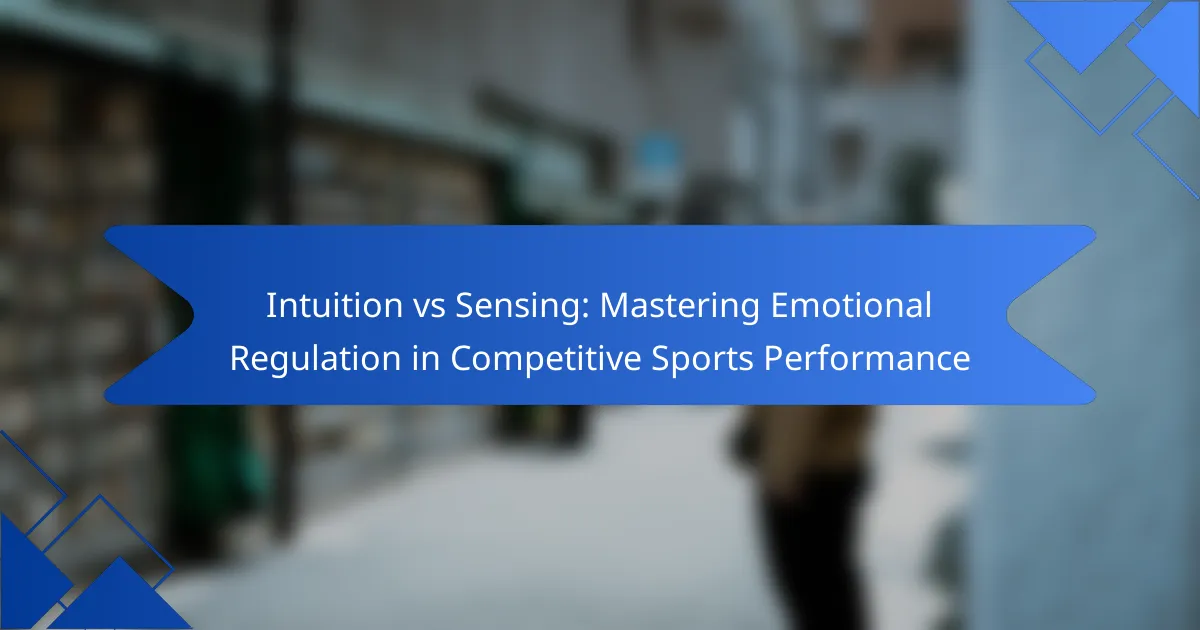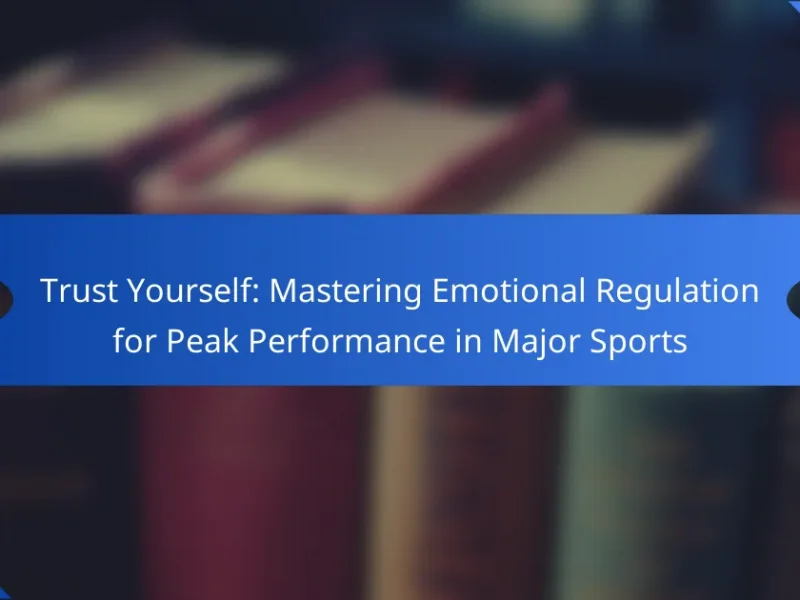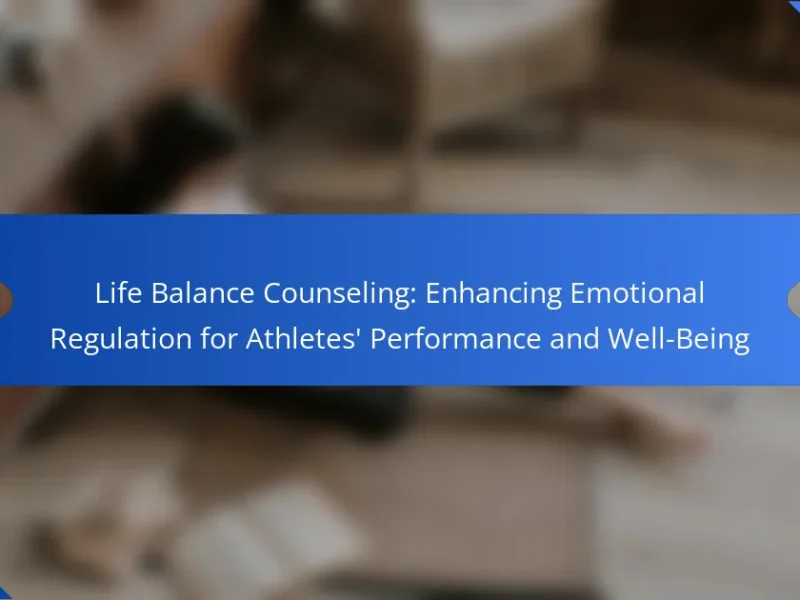Mastering emotional regulation is crucial for athletes aiming to enhance their competitive performance. Intuition aids quick decision-making and stress management. Sensing fosters awareness of physical sensations and emotional states. Understanding the distinct emotional regulation strategies across sports disciplines can optimize athletes’ responses under pressure.

What role does intuition play in emotional regulation during competitive sports?
Intuition plays a critical role in emotional regulation during competitive sports by enabling athletes to make quick, instinctive decisions. This ability helps athletes manage stress and maintain focus, enhancing overall performance. Studies show that athletes who trust their intuition often experience improved emotional stability, allowing them to adapt to the dynamic nature of competitive environments. Additionally, intuition can serve as a unique attribute that differentiates high-performing athletes from their peers, as it often leads to better situational awareness and timely responses during competitions.
How does intuition influence decision-making in high-pressure situations?
Intuition significantly enhances decision-making in high-pressure sports situations by enabling rapid responses. Athletes often rely on instinctive judgments developed through experience, allowing them to react quickly without overthinking. This emotional regulation fosters resilience, helping competitors maintain focus and composure under stress. Studies show that intuitive decision-making can lead to improved performance outcomes, as it integrates subconscious processing of past experiences. By mastering this skill, athletes can leverage intuition to navigate competitive environments effectively.
What are the psychological underpinnings of intuitive responses in athletes?
Intuitive responses in athletes stem from their ability to regulate emotions effectively. This emotional regulation enhances decision-making and performance under pressure. Research shows that athletes who harness intuition often rely on subconscious processing, allowing them to react swiftly to dynamic situations. Unique attributes of intuitive responses include heightened awareness and rapid information processing, which can significantly impact competitive outcomes. As a result, mastering emotional regulation is essential for athletes aiming to optimize their intuitive capabilities.
What cognitive processes are involved in intuitive decision-making?
Intuitive decision-making involves rapid cognitive processes such as pattern recognition, emotional awareness, and subconscious analysis. These processes enable athletes to make quick decisions in high-pressure situations, leveraging past experiences and instinctual responses. Emotional regulation plays a crucial role, as it allows athletes to manage stress and maintain focus, enhancing performance. Studies show that effective emotional regulation can significantly improve decision-making accuracy in competitive sports.
How can athletes train their intuition for improved performance?
Athletes can train their intuition through focused mental exercises and emotional regulation techniques. Practicing mindfulness enhances awareness, allowing athletes to recognize and interpret their instincts effectively. Visualization techniques can simulate competitive scenarios, fostering intuitive decision-making. Additionally, engaging in reflective practices post-performance helps athletes analyze their intuitive responses, refining their skills over time. Regularly integrating these methods into training routines builds a strong foundation for improved performance.

How does sensing contribute to emotional regulation in sports?
Sensing enhances emotional regulation in sports by fostering awareness of physical sensations and emotional states. This heightened awareness allows athletes to recognize stressors and manage their responses effectively. By tuning into their bodies, athletes can adjust their mental states, leading to improved focus and performance. Research indicates that athletes who utilize sensing techniques often experience lower anxiety levels and heightened confidence during competitions.
What are the key differences between intuition and sensing in emotional contexts?
Intuition emphasizes gut feelings and holistic insights, while sensing relies on concrete data and immediate experiences. In competitive sports, athletes can leverage both for emotional regulation. Intuition helps in quick decision-making under pressure, while sensing allows for grounded responses to stimuli. Balancing these approaches enhances performance by integrating instinctive reactions with factual assessments.
How can athletes leverage sensing to enhance their performance?
Athletes can enhance their performance by leveraging sensing to improve emotional regulation. Sensing allows athletes to become more aware of their physiological and emotional states, leading to better decision-making during competition. By tuning into their body signals, athletes can identify stress or anxiety and implement strategies to manage these feelings effectively. This heightened awareness fosters resilience and focus, ultimately enhancing performance outcomes. For example, techniques like mindfulness and breathing exercises can help athletes harness their sensing abilities to maintain composure under pressure.
What techniques can improve an athlete’s sensing abilities?
Athletes can enhance their sensing abilities through various techniques such as mindfulness training, visualization, and sensory integration exercises. Mindfulness training improves focus and awareness of bodily sensations. Visualization techniques help athletes mentally rehearse scenarios, enhancing their responsiveness. Sensory integration exercises, like balance and coordination drills, refine the brain’s processing of sensory information, leading to quicker reactions in competitive settings.

What are the universal attributes of emotional regulation systems in sports?
Emotional regulation systems in sports universally emphasize self-awareness, emotional control, and adaptive coping strategies. These attributes enhance athletes’ performance by fostering resilience and focus under pressure. Self-awareness allows athletes to recognize emotional triggers, while emotional control enables them to manage responses effectively. Adaptive coping strategies provide tools for dealing with stress and setbacks, ultimately improving competitive outcomes.
How do emotional regulation systems impact overall athletic performance?
Emotional regulation systems significantly enhance athletic performance by improving focus and resilience. Athletes who master these systems can better manage stress and anxiety, leading to improved decision-making during competition. Research indicates that effective emotional regulation correlates with higher performance metrics, such as faster reaction times and better overall scores. Athletes utilizing techniques like mindfulness and cognitive restructuring show unique advantages in maintaining composure under pressure, ultimately impacting their competitiveness and success in sports.
What common strategies do athletes use for emotional regulation?
Athletes commonly use strategies such as mindfulness, visualization, and self-talk for emotional regulation. These techniques help manage stress and enhance focus during competition. Mindfulness promotes present-moment awareness, reducing anxiety. Visualization aids in mentally rehearsing performance scenarios, boosting confidence. Self-talk involves positive affirmations that counter negative thoughts, fostering resilience.

What unique attributes differentiate emotional regulation strategies among sports disciplines?
Emotional regulation strategies differ significantly across sports disciplines due to unique attributes like competition intensity, emotional demands, and required focus levels. For instance, team sports often emphasize collective emotional management, while individual sports require personal resilience and self-regulation. Unique attributes such as the reliance on intuition in high-pressure scenarios are more pronounced in sports like basketball, whereas sensing strategies dominate in sports requiring precise timing, like archery. Understanding these distinctions enhances athletes’ performance by aligning their emotional strategies with the specific demands of their sport.
How do team sports differ from individual sports in emotional regulation approaches?
Team sports often emphasize collective emotional regulation, while individual sports focus on personal strategies. In team sports, athletes rely on group dynamics and shared experiences to manage emotions. This collaborative approach can enhance motivation and resilience. Individual sports, however, require self-regulation techniques tailored to personal emotional responses. Athletes often utilize mindfulness and self-talk to maintain focus. The unique attribute of team sports is the interdependence among players, which can create a supportive environment for emotional management. In contrast, the rare attribute of individual sports lies in the necessity for self-sufficiency in emotional regulation.
What unique emotional regulation challenges do elite athletes face?
Elite athletes face unique emotional regulation challenges due to high pressure, intense competition, and performance expectations. These factors can lead to anxiety, stress, and burnout. Athletes often struggle with balancing emotion and intuition, impacting decision-making during critical moments. Mastering emotional regulation enhances performance and resilience.

What are the rare attributes of emotional regulation systems in high-stakes competitions?
High-stakes competitions reveal rare attributes of emotional regulation systems, such as adaptive flexibility, heightened situational awareness, and resilience under pressure. These attributes enable athletes to intuitively respond to dynamic environments, optimizing performance. Additionally, the integration of emotional intelligence enhances decision-making, allowing competitors to maintain composure and focus. The interplay between intuition and sensing plays a critical role in navigating the complexities of competitive sports.
How do cultural factors influence emotional regulation in sports?
Cultural factors significantly shape emotional regulation in sports by influencing athletes’ responses to competition. Different cultures prioritize distinct emotional expressions, impacting how athletes manage stress and anxiety. For instance, collectivist cultures may emphasize group harmony, leading athletes to suppress individual emotions for team cohesion. Conversely, individualistic cultures might encourage open emotional expression, allowing athletes to channel emotions into performance. Understanding these cultural nuances enhances coaching strategies and athlete support systems, promoting optimal emotional regulation tailored to diverse backgrounds.
What innovative emotional regulation techniques are emerging in competitive sports?
Innovative emotional regulation techniques in competitive sports include mindfulness training, cognitive restructuring, and biofeedback. These methods enhance athletes’ focus, reduce anxiety, and improve performance under pressure. Mindfulness training promotes present-moment awareness, allowing athletes to manage stress effectively. Cognitive restructuring helps athletes reframe negative thoughts, fostering a positive mindset. Biofeedback utilizes technology to provide real-time physiological data, enabling athletes to optimize their emotional responses. These techniques represent a unique shift towards integrating mental health strategies within sports training.

What best practices can athletes adopt for mastering emotional regulation?
Athletes can adopt several best practices to master emotional regulation. First, they should develop self-awareness through mindfulness techniques, which enhance emotional insight. Second, establishing routine mental training, such as visualization, can help athletes prepare for competitive scenarios. Third, employing breathing exercises can regulate physiological responses to stress. Finally, seeking feedback from coaches and peers fosters a supportive environment for emotional growth.
How can athletes integrate intuition and sensing for optimal performance?
Athletes can enhance performance by integrating intuition and sensing, fostering emotional regulation. Intuition allows quick decision-making, while sensing provides awareness of physical states. Together, they create a balanced approach to competition. Training methods can include mindfulness practices to sharpen intuition and body awareness exercises to enhance sensing. Regular reflection on past performances can also improve these skills, leading to better emotional control during competitions.
What common mistakes do athletes make in emotional regulation, and how can they be avoided?
Athletes often struggle with emotional regulation, leading to performance issues. Common mistakes include ignoring emotions, overreacting to stress, and failing to practice mindfulness. To avoid these pitfalls, athletes should acknowledge their feelings, develop coping strategies, and engage in regular mental training. This proactive approach enhances competitive performance by fostering resilience and focus.
What expert insights can improve emotional regulation strategies in sports?
Expert insights for improving emotional regulation strategies in sports emphasize the balance between intuition and sensing. Athletes can enhance performance by developing awareness of their emotional states and utilizing techniques such as mindfulness and visualization. Research shows that athletes who practice emotional regulation report higher levels of focus and resilience. Incorporating feedback mechanisms, like performance reviews, can also aid in refining these strategies, fostering a deeper understanding of emotional triggers and responses in competitive settings.


